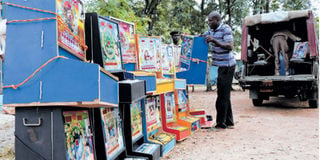Owners of betting machines fight countrywide crackdown

Slot machines in Kisumu on October 30, 2016. PHOTO | TONNY OMONDI | NATION MEDIA GROUP
What you need to know:
The machine owners, now totalling 112, have turned to the Constitution for redress, arguing that the police should not have interfered with businesses that fall under county governments.
They first convinced the court to halt the government’s offensive on November 15. And on Wednesday, Justice Edward Muriithi extended the order to December 7 when the case will be heard.
Owners of betting machines have fought back against a nationwide crackdown by the government, convincing the High Court to temporarily stop raids on their premises.
The machine owners, now totalling 112, have turned to the Constitution for redress, arguing that the police should not have interfered with businesses that fall under county governments.
They first convinced the court to halt the government’s offensive on November 15. And on Wednesday, Justice Edward Muriithi extended the order to December 7 when the case will be heard.
Those mentioned in the suit are the Betting Control and Licencing Board, the Interior ministry, the inspector-general of police, the attorney-general, the director of public prosecutions and the council of governors.
The betting machine owners are particularly opposed to a September 19 letter that the board wrote to county commissioners, ordering them to work with the police in making the public aware about the “illegal” machines and to mount a major crackdown to confiscate them. They want those orders quashed.
Following the order, a number of machines were impounded in Kisumu, Kisii and Samburu counties.
Four Chinese nationals who were in possession of hundreds of gambling machines in the town’s Milimani estate in Kisumu were arrested. A court later issued orders to deport the four.
The raid also saw police impound at least 150 machines in Kisii. Seventy-two among them were found in a truck as they were being transported to Nairobi.
NINETEEN PEOPLE
It also led to the arrest of 19 people and the confiscating of 32 machines in Maralal Town.
But the traders say all this “harassment” is a violation of their fundamental rights.
“The idea and the allegations that we are operating illegally are both false and malicious as our businesses are duly licensed by county governments under which our activities fall under,” says Ms Mary Wanjiru, one of the petitioners, in a petition filed by Kinoti and Kibe Company Advocates.
She adds: “The allegation that our machines are a danger to national security are false and malicious.”
“Equally, the allegation that our businesses will lead to gambling addiction among the youth is false and discriminatory for the obvious fact that the major gambling companies like SportPesa, mCHEZA, Betin and others have been allowed to advertise their services anywhere and without hindrance.”
The petitioners want the court to declare that betting premises, once registered by a county government, should be considered to be existing legally.
They also want a declaration that the betting board “has no jurisdiction over betting, casinos and other forms of gambling carried out pursuant to Part 2, Paragraph 4 of the Fourth Schedule of the Constitution”.
In response to the traders’ case, betting board chairman Anthony Kimani agrees that the new Constitution places the responsibility of regulating betting companies on both the national and county governments, though the TA’s report placed the mandate on its shoulders.
'BETTING BOARD'
“Betting control and licensing is a concurrent function of both the national government and the county government. However, it was resolved by the Transitional Authority Report of January 18, 2016 that the regulation of the gaming industry and licencing of gaming activities and casinos would be the responsibility of the national government through betting board,” he states.
The traders are also seeking an order to compel police to return their gaming machines.
“The Betting Control and Licensing Board has no powers or authority over the betting activities which fall within the jurisdiction of county governments,” it adds.
Chinese individuals have been spotted in most establishments where the slot machines operate across, fanning belief that people from the Asian country are deeply involved.
The betting board chairman says in his response: “I am aware that the machines are being operated by an organised criminal syndicate in full disregard of the gaming law”.
However, the petitioners say their association with the Chinese is an attempt to tarnish their reputation.
“The allegation of Chinese involvement in our businesses is further meant to discredit us and delegitimise our business,” states Ms Wanjiru.





